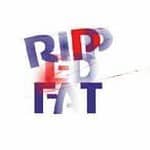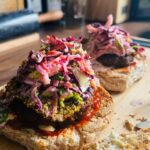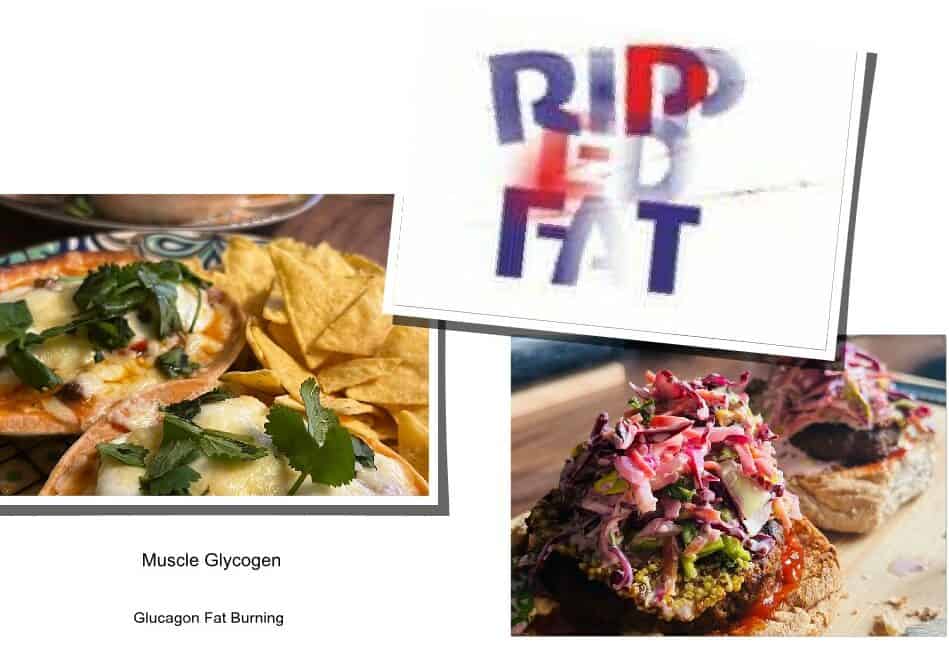High Protein Low Carb Foods |Glycogen Best Carbs For Muscle Growth
RIPPEDFAT

High Protein Low Carb Foods
Triggers Fat Burning Hormones
Understanding a high protein low carb foods diet involves comprehending the roles of three hormones: insulin, glucagon, glycogen and glucose. These hormones are crucial for maintaining lean muscle mass, managing body fat storage, and regulating insulin levels. Insulin is a direct response to glucose from carbohydrate food and pivotal in fat storage as it inhibits the breakdown of proteins, carbohydrates, and fats, thereby preventing the body from using its own fat as a primary energy source. A diet high in carbohydrates can lead to excessive insulin, and glycogen fat storage which favours sugar burning over fat burning. This can hinder weight loss, as carbohydrates quickly convert to sugar in the bloodstream, promoting fat storage. To shift the body’s energy source from sugar to fat, insulin levels must be reduced by limiting high-sugar carbohydrates.
Glucose in the bloodstream, which is glycogen stored as fat, it is a direct response to insulin and cannot be lost as weight due to sugar levels in your body. Before weight loss can commence, you must eliminate all sugar stored as glycogen in the liver and skeletal muscle. Once the insulin hormone has been gradually depleted, your metabolism can begin burning fat, triggered by the hormone glucagon, which forces the body to seek an alternative energy source and uses stored fat, providing a more efficient and better energy source than glucose. If you’re struggling to lose weight, it may be because your body has been relying on sugar stored as glycogen, which must be eliminated before fat burning can start. Choosing best carbs for muscle growth in your diet will deplete glucose levels with intense exercise to utilize glycogen stored fat for fuel shape up and build muscle mass.

Best Carbs
For
Muscle Growth
Best Carbs
For Muscle Growth
Glucose in the bloodstream, which is stored as fat, it is a direct response to insulin and cannot be lost as weight due to sugar levels in your body. Before weight loss can commence, you must eliminate all sugar stored as glycogen in the liver and muscles. Once the insulin hormone has been gradually depleted, your metabolism can begin burning fat, triggered by the hormone glucagon, which forces the body to seek an alternative energy source and use stored fat, providing a more efficient and better energy source than glucose. If you’re struggling to lose weight, it may be because your body has been relying on sugar stored as glycogen, which must be eliminated before fat burner weight loss can start.
This depletion of insulin triggers the glucagon hormone, facilitating a state conducive to fat burning higher metabolism, preventing fat storage, and utilizing stored fat from the liver and muscles. Conversely, to build or maintain muscle mass, ample carbohydrates are necessary. They break down into glucose, which then converts to glycogen, a key metabolic fuel for muscles. The glucagon hormone process can lead to ketosis, a keto weight loss where the body produces ketones, signalling a state favourable to fat burning hormones unlike glycogen promotes fat storage when not being utilized for metabolic fuel.
Glycogen, stored in the liver and muscles, is the primary fuel source for your muscles. Having more muscle mass makes it more challenging to gain weight. Muscle glycogen, which responds to training and diet, is a preferred energy source and is directly related to glucose—the main energy source stored as fat. Consuming high-sugar carbohydrates raises blood sugar levels, which is then converted to glucose and forms glycogen, primarily stored in skeletal muscles or the liver.
To promote glycogen formation while keeping glucose levels low, it’s beneficial to consume high protein low carb foods. Glycogen is excellent for muscle building during and post-workout but is not ideal for fat burning and weight loss unless you are actively expending energy, as unused glycogen can be stored as fat.
Carbohydrates are crucial for muscle metabolism and act as a healthy energy source, opting for slow release complex carbs opposed to their fast release simple sugar counterparts. The activation of the glucagon hormone signals the body to release stored fat, aiding fat burning hormones.
In contrast, the glycogen hormone maintains fat storage until the body needs energy. Glycogen, which acts counter to glucagon, is stored as fat and can impede weight loss. Incorporating high protein low carb foods into your diet can help maintain low insulin levels and prevent fat storage.
Understanding the best carbs for muscle growth is crucial for weight loss or muscle growth. Weight cannot be lost if glucose levels in the bloodstream are converted into glycogen and stored as fat. Similarly, muscles cannot be built or toned because the glucagon hormone, which enables the fat-burning process, is not activated to facilitate weight loss. Fat-burning hormones don’t directly cause weight loss; instead, they accelerate the process.
They unlock stored fat to break down glucose, which is formed as glycogen and can be used as fuel for energy during training. This process occurs simultaneously with the breakdown of muscle glycogen during intense and prolonged physical activity.
Details
top best carbs for muscle growth
Protein, low-fat, and low-carb foods, along with ketones, play a crucial role in muscle growth for lean muscle mass.
Best Blood And Glucose Meter
Understanding the role of fat-burning to weight loss such as insulin and glucagon, glycogen hormones, the breakdown of glucose, their chemical structure of fats, and the reduction of blood sugar levels is crucial when adopting an intermittent fasting ketosis lifestyle.
Firstly, it’s necessary to deplete the insulin hormone, which the pancreas releases in response to increased blood sugar levels. The pancreas, through hormones like glucagon and insulin, keeps blood glucose levels within a tight range of 4–6 mM. This balance, known as glucose homeostasis, is achieved through the counteracting actions of glucagon and insulin.
When the body’s blood sugar levels rise, the pancreas produces insulin, which helps transport glucose out of the bloodstream and into cells, causing blood sugar levels to decrease. Once inside the cells, glucose can be used in three ways:
– It can be utilized immediately for energy.
– It can be transformed into a form of glucose called glycogen and stored in the liver and muscles for future use (insulin aids in this process by promoting the liver to convert glucose into glycogen.
– Alternatively, it can be stored as fat. If glycogen reserves are full, any excess glucose is then stored as fat.
The aim of a ketosis lifestyle is to prevent insulin spikes, which means incorporating more protein and fat into your diet, including meat, fish, butter, eggs, and a variety of animal food sources for protein, fats, and dairy. When your body operates on ketones, you don’t necessarily have to worry about consuming fats from foods if your goal is weight loss. In nature, very few sources are pure protein; they are usually a mix of protein, carbohydrates, and fats.
Understanding that you are adopting an intermittent fasting lifestyle is crucial. A quick method to verify if you are in ketosis is to buy a ketone strip from a drugstore. These strips, commonly used by diabetics, measure the ketone levels in your urine. Transitioning to intermittent fasting typically doesn’t take long; it can happen within a few days to a week, especially if you haven’t already depleted your glycogen stores.
Cottage Cheese a 4oz serving contains
Greek Yogurt a 7oz serving contains
Eggs One whole Extra Large Egg provides
Tofu
Chicken Breasts
Salmon 100gs contains

- 12g protein
- 5.5g carbohydrate
- 92 calories
- 20g protein
- 8g carbohydrate
- 146 calories
- 7g protein
- 0.5g carbohydrate
- 80 calories
- 8g protein
- 1.88g carbohydrate
- 52% fat
- 31g protein
- 165g carbohydrate
- 3.6g
- 62% protein
- 0% carbohydrate
- 38%
High
Protein
Low Carb
Foods
Muscle and fat function differently within the body; muscle is significantly more metabolically active than fat and requires more energy to maintain. Fat serves as an alternative energy source but if you are not an active person throughout the day it will store as fat and will end up as belly fat on your body. The best carbohydrates for muscle growth are found in high-protein, low-carb foods which help deplete insulin levels and break down glucose.
This process activates both glycogen and glucagon, allowing the body to utilize its own fat. Fat serves as an alternative energy source; by tapping into fat reserves and using real ketones, you can achieve weight loss and muscle definition. Ketones are beneficial for lean muscle mass; when the body is in ketosis, it not only fuels and shapes muscle but also uses fat more efficiently, which is advantageous for cognitive function. During cardio exercises, a high heart rate leads to significant glycogen use, which is why having stored energy in the muscle belly is beneficial, as it is immediately needed and used.
A balanced combination of foods optimized for fat and weight loss can kick-start your metabolism and help manage hunger cravings. The approach is simple: reduce your intake of high-sugar carbs and increase consumption of high-fat foods to stimulate your metabolism, while including animal proteins, fats, and fiber of max fat burner foods in your everyday diet. This way, you can attain both fat loss and muscle growth without needing to be an elite bodybuilder to achieve well-defined muscles.
Fats found in protein-rich foods are neutral and do not cause significant spikes in insulin levels. In the body, fats are not fully dissolved; instead, they emulsify into tiny droplets, which allows them to be converted back into usable fat for energy. After metabolism, these fats enter the bloodstream and can be used either for energy or stored. Including more healthy fats, proteins, and fiber in your diet can lead to a more effective metabolism and improve your metabolic rate, aiding in more efficient fat burning.
